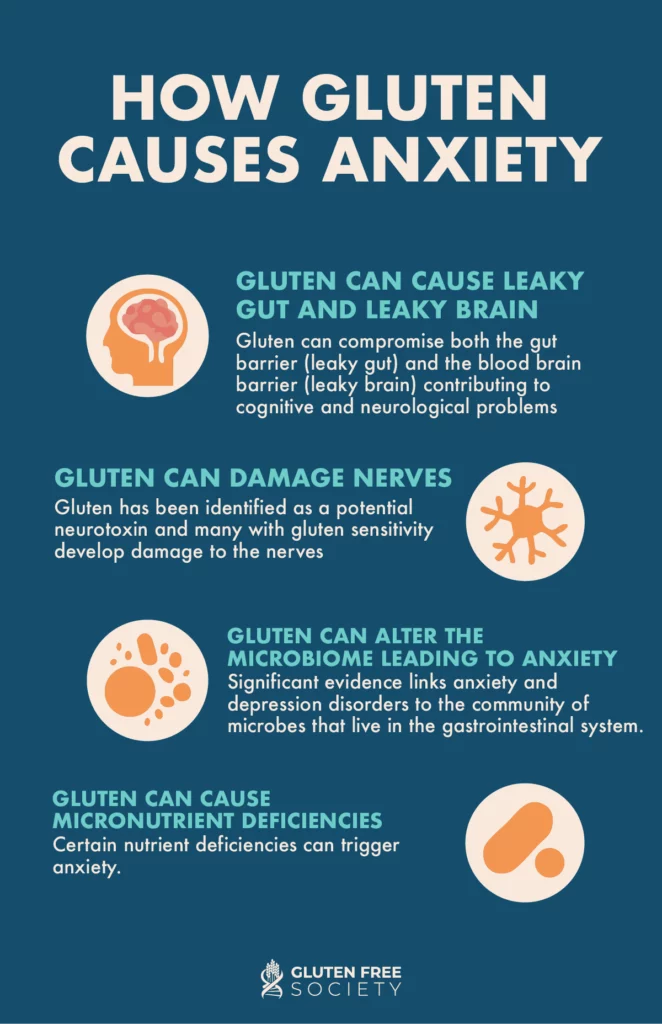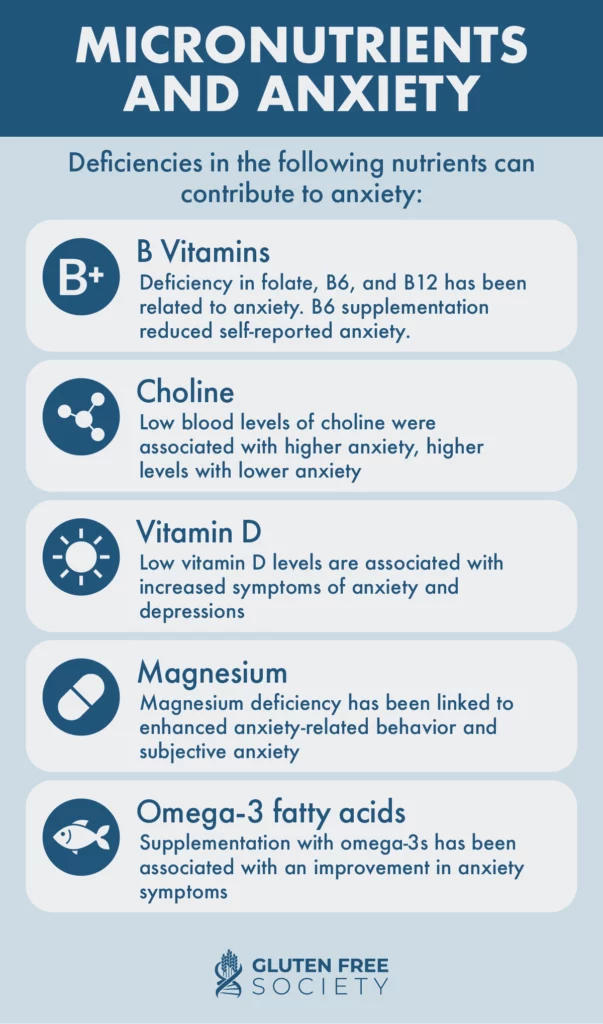new to the gluten free journey?
new to the gluten free journey?

Gluten is associated with many different symptoms. Most often, we hear about the gastrointestinal discomfort that gluten can cause. But the reality is, the effects of gluten extend far beyond digestion. From the skin to the brain, gluten can impact the function of so many parts of the body. But can it even affect things like anxiety? The short answer is yes, but we explore the subject of gluten and anxiety in depth in this article.
Gluten is the protein in grains that lends elasticity to bread and other baked goods. Gluten is often associated with wheat, rye, and barley. However, we know that gluten protein can be found in ALL grains. Common foods containing gluten include pasta, bread, baked goods, and beer, as well as many sauces, condiments, and marinades.
For those with celiac disease, gluten can be incredibly harmful. Gluten can trigger an immune reaction causing inflammation in the intestines, which can result in a host of other health issues.
Anxiety is an emotion that is characterized by feelings of excessive and persistent tension, worried thoughts, and physical changes.
Contents
ToggleOccasional anxiety is a normal part of life. Most people have some occasional worry about things like their health, money, family, or careers. But anxiety disorders involve more than mild or temporary worry or fear. People with anxiety disorders suffer from constant anxiety that does not go away and can even intensify over time.
People with anxiety tend to have recurring intrusive thoughts or concerns that can alter their quality of life and can even cause them to avoid certain situations out of worry. Anxiety can interfere with daily activities such as job performance, school work, and relationships.
Anxiety can also cause physical symptoms like sweating, trembling, dizziness, nausea, loss of appetite, rapid heartbeat, or high blood pressure.
Anxiety can be caused by a number of different medical conditions and lifestyle factors. Several potential causes and risk factors are listed below.
Examples of medical problems that can be linked to anxiety include the following:
The following risk factors may increase the risk of developing an anxiety disorder:
There are a number of mechanisms by which gluten can contribute to anxiety as described below:
Gluten can cause leaky gut and leaky brain
Gluten can cause a condition called leaky brain by compromising the blood brain barrier – a critical layer that protects the brain from harmful substances. Any disruption in the blood brain barrier can influence cognitive or brain function.
In addition, gluten can compromise the gut barrier, a condition called intestinal permeability or leaky gut. When the gut is permeable or “leaky”, it cannot properly absorb nutrients. These gluten-induced nutritional deficiencies can then contribute to neurological problems and also impair the repair and healing of the gut.
Read more about the connection between gluten and leaky gut and leaky brain here.
Gluten can damage nerves
Gluten has been identified as a potential neurotoxin, and many with gluten sensitivity do not manifest symptoms of classic celiac disease, but instead develop nerve damage. In one study, a correlation was found between patients with idiopathic neuropathy (nerve damage of an unknown cause) and the presence of gluten intolerant HLA-DQ genes.
Gluten can alter the microbiome leading to anxiety
Research on the microbiome–gut–brain axis shows that the gut microbiota and the brain are interconnected. Significant evidence links anxiety and depression disorders to the community of microbes that live in the gastrointestinal system.
Gluten can cause micronutrient deficiencies
Certain nutrient deficiencies can trigger anxiety. We discuss this in more detail in the next section.

Deficiencies in the following nutrients can contribute to anxiety:
B vitamins
Research has found that B complex vitamins with minerals showed benefit for symptoms of acute anxiety. Complex B vitamins generally include Vitamins B1 (thiamine), B2 (riboflavin), B3 (niacin), B5 (pantothenic acid) B6 (pyridoxine), B7 (biotin), B9 (folate), and B12 (cobalamin). Research has concluded that deficiency in these vitamins, in particular folate, B6, and B12, has been related to several neurological disorders, including anxiety.
Another study highlights Vitamin B12 deficiency especially, as it can have serious neuropsychiatric symptoms, including anxiety. And another study found that vitamin B6 supplementation reduced self‐reported anxiety.
Choline
B complex vitamins occasionally include choline. Choline is sometimes referred to as vitamin B4 and is an important nutrient for brain and neurological health. Choline is a bulky nutrient, meaning it takes up a lot of space in a supplement. For that reason, even when choline is included in a supplement, it is in very small amounts, typically 10% or less of the optimal daily intake.
Choline in anxiety and depression: the Hordaland Health Study – ScienceDirect.
One study examined the cross-sectional association between plasma choline concentrations and scores of anxiety symptoms in a general population sample. It found that choline concentrations were negatively associated with anxiety symptoms. In other words, low blood levels of choline were associated with higher anxiety, and higher blood levels of choline were associated with lower anxiety.
Vitamin D
We know that there are points where the brain regions involved in the pathophysiology of anxiety intersect with those that are involved with vitamin D metabolism. Research has found that low vitamin D levels are associated with increased symptoms of depression and anxiety.
Nearly one third of the United States population is deficient or severely deficient in vitamin D, putting them at higher risk of a number of health conditions, including anxiety. Vitamin D is difficult to obtain through diet as it has limited food sources. Choose a high quality vitamin D supplement that includes vitamin D3, not vitamin D2.
Magnesium
Magnesium supports over 300 enzymatic reactions throughout the body, and it is believed that magnesium may help to control chemical messengers (neurotransmitters) in the brain, which can influence feelings of anxiety.
We also know that there is evidence that magnesium modulates the hypothalamic-pituitary adrenal (HPA) axis, which mediates the effects of stressors by regulating many different physiological processes.
One study tested whether magnesium deficiency is associated with altered HPA axis function in mice. Compared with controls, magnesium deficient mice did indeed display enhanced anxiety-related behavior in a battery of established anxiety tests.
Another systematic review found evidence that suggests that magnesium has a beneficial effect on subjective anxiety.
If you choose to supplement, we suggest a product that contains magnesium glycinate, which is a well absorbed and well tolerated form. Excess magnesium citrate and magnesium oxide can cause gastrointestinal discomfort and loose stools.
Omega 3 fatty acids
Omega 3 fatty acids support brain and neurological health, so it makes sense that they may play a role in anxiety. A systematic review and meta-analysis of 19 clinical trials including 2240 participants from 11 countries, showed improvement in anxiety symptoms was associated with omega-3 polyunsaturated fatty acid supplementation.

We encourage anyone suffering with symptoms of anxiety to seek support. However, we also want to encourage and empower those with anxiety to consider some diet and supplement changes that can help support their health. The following are a few simple steps you can take:
Stay up-to-date with the latest articles, tips, recipes and more.

*These statements have not been evaluated by the Food and Drug Administration. This product is not intended to diagnose, treat, cure or prevent any disease.
If you are pregnant, nursing, taking medication, or have a medical condition, consult your physician before using this product.
The entire contents of this website are based upon the opinions of Peter Osborne, unless otherwise noted. Individual articles are based upon the opinions of the respective author, who retains copyright as marked. The information on this website is not intended to replace a one-on-one relationship with a qualified health care professional and is not intended as medical advice. It is intended as a sharing of knowledge and information from the research and experience of Peter Osborne and his community. Peter Osborne encourages you to make your own health care decisions based upon your research and in partnership with a qualified health care professional.